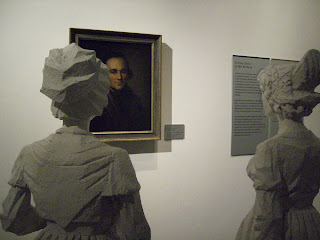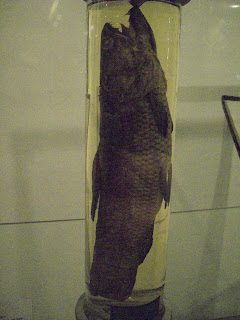[Wissen (une différence en espagnol et en français, ‘savoir-saber’, ‘conocer-connaître’… ‘to know’ gives you no difference, as if it was the same, to know an object, to know about an object—autour de l’objet, comme si on se jetait à part, au-dehors de l’objet toujours-déjà jeté) ‘herum’, vielleicht.]


Was does ignorance mean?
[More than ever, you needed your camera, several layers before what you don’t know. You approached the building with the images in your head, as well as with the word: Wound. For several moments you believed that that was the meaning of the building, that that explained its form.
You walked wrongly, your path was the wrong one—you had to come back. Gehen wir zurück, ein bisschen, nur eins oder zwei Schritte. From outside, since the beginning, you started layering, one or two photos, one or two steps of difference, between it and you.]

 Qu’est-ce qu’est-ce l’ignorance?
Qu’est-ce qu’est-ce l’ignorance?[L’objet. L’objet pour écrire, pour jeter au-dehors—werfen, werfen nach dir. Ob, ab-jet. C’est cela le sujet? De cette thèse? Au commencement, une machine, une machine-à-écrire. Oder vielleicht eine Webenmaschine. Singer, Ô muse… Abwerfen, Objeter, j’objecte, yo objeto, I object: “J’accuse”.]

 ¿Qué es la ignorancia?
¿Qué es la ignorancia?[Das ist unklug, was etwas ist, das nicht ist, was etwas bedeutet—Deutsch hilft dich hier, ist es einfach auf Deutsch danach zu fragen. Das ist der Grund für ein Philosoph zu sein. Tan sólo debes recordarlo. Darle cuerda de nuevo. Se rappeler, se dire encore—une autre fois—ce qui était le cas—travail du philosophe. Rien plus simple. Nicht wahr? Aber es gibt noch die Objekte. Se objetivo. Sé.]





Was ist das Ereignis?
[You learned a new word for ‘event’ today in class: ‘Veranstaltung’—veranstalten, that is ‘to organize’. (You hear an ambulance now). How does someone organize this? With how many organs? (You feel that the sound of a violin will always remain alone, that nothing can make it obscure—rends ça obscure pour moi, un petit peu.) Between bureocracy and the flesh (“what pain was yours, what pain was mine”—you hear now) a new organization, that not only destroys—not, something else (“no one has to be alright all of the time… do I have to be alright all of the time?”) happened here too—appeared, or just the peak of the organizing instinct—rendre fonctionnel—le comble. Wahrlich? How much of this had to do with the truth? It depends how do you understand truth. Perhaps as what it guides. Look up.]



Que signifie l’événement?
[Outside for a moment, before really going in—going down—you try to listen. You’re getting a little confused here. And this is not only because of the languages. You go inside, and start climbing. The truth is always upwards—at least it seems so. You turned back your face (and your camera) for a moment, and take a picture of the ascension—nothing tells you that that is the same way for going back (down). If you keep climbing, that takes you nowhere. Irgendwo, gibt keinen Weg hier es. Donne-moi le chemin—you feel a little ridiculous now, with your dictionaries on your lap, plus the ones you have opened on your screen—Kein Problem, das ist dein Werk.]






What is ignorance?
[Go back to what you know, words—you always need to be reminded of this. Even though you can read nothing, you ‘recognize’ the letters. Die Bücher, nein für nichts. (Tu penses maintenant au ‘plaisir du texte’ de Barthes, et au plaisir que Molloy pense peut-être donner à sa mère quand il lui donne un baiser—à quoi penses tu vraiment? Vois haut.) Although that sends you back to the image, and to the measurement—la medida de la imagen—comment rend-on compte d’une image? On dit des mots. “Que voulez-vous, Monsieur? C’est les mots. On n’a rien d’autre.” (Beckett).
(“to spend a little time screaming in the gutter”)]








On ignore.
[Dans la miniature, quel est l’objet? (you ask this question while listening to ‘Iris’ von Wim Mertens) Die Welt der Kinder. You found it better without a face. ‘To the unborn child’. Nur ein Spiel. You don’t need glasses—yet—but perhaps with the animal-relics you understand better. Toujours une illusion, mais cela te donne quelque chose, tu te sens agrippé. “Ja, ich mag die unheimliche Tiere”. What is the word for shark? ‘What is the word?’—you keep thinking on the big mouth, the dried big mouth—that sends you to the text again. What is it that you are seeing—that you’re supposed to be seeing—here? Der man arbeitet, obwohl er nicht mit seiner Hände da berühret. “Berühren nicht, bitte.”]





One ignores.
[One tried to explain to you the meaning of a Hammer on the skin. But in the skin? Defend yourself, take the picture. For a moment you cannot remember the word in French for ‘to cure’: guérir—ça t’est venu à la tête sans dictionnaire—‘ohne Lexikon’ sagte deine Lehrerin heute. Kreuz. Die Erinnerung, die Nägel. Es ist hier—man muss nicht vergessen—one is reminded always. Take the picture. Noch einmal.]






Man ignorieret.
[Nicht immer das Gleich(es). You have doubts about this noun—keine Substanz hier. You have doubts about what you take pictures of. Thus, you look for the old woman, you frame her—just in the window. You take the camera and take the old camera. Nehmen Sie etwas? Je prends conscience—au moins j’essaie. (“I thought he was a man but he was a little boy”). Welches Museum ist das? Es gibt Bilder. For a moment you’re the traveler again, art-traveler. Take one two paintings—sin nombre. This is your album.]









Ignora.
[Mit der Zeit, alle wird komplizierter. The letters on the floor tell you how much time is it—here. “Was würdest du mitnehment…?” Letters, letters. Buchstaben. Zuerst das Buch. Au commencement, la lettre. ¿Y la carta? Deine Briefe werden Bücher, willst du das? Ja. Und das Gesicht? Du hast schon gesehen. In another time, although always the same story. Was ist deine Geschichte? (“Je fuyais pour trouver une âme mais j’ai trouvé un homme déserté… un homme déserté…” écoute’j maintenant…vielleicht: “j’ai trouvé un Nomme… déserté…wenn man besser hört).











Ve.
[In Spanish, that is—Ve—an imperative: “see!” or “go!” What is the difference? With what, or how does one go? Go where? Irgendwo. (It will take you time to learn this structure…but you will…that is what is uncanny, and sometimes scary). (You listen now to ‘Lento: le campane suonane mattutino’—Puccini.) Vais. Geh. The small verbs lose the ‘e’ told me my Lehrerin. ‘Ve’. Go. See. Always fast—immer fast—toujours presque. Près—in der Nähe. You almost grasp that. You’re close. Almost at the end—casi donde está todo—most-of-it. That is to speak. (In a manner of speaking—die Manner sprechen—eine Art von Sprache. Un arte de hablar. Kunst.) “So einfach war das” Was? War. It will take time. Nehmen Zeit oder nehmen die Zeit. Kleine Differenz. (How does man translate ‘différance’ in German?). Es wird (die) Zeit nehmen. Es. “On. Say on.” “Es, di, es.” Between Greek and English—Spanish and English “Usted no habla español, ¿verdad?”








In dem Zug.
Zuerst, der Himmel. (Es war). Reisen. Raise. La verdad en español. Look down, but not ‘on’ jmd—that is to go back to the same thing. Zurück. Zum Zug. One by one. Raisin. “We swore to be together, until the day we die”.


“Beuys und Wittgenstein fliegen in einer Flugzeug. Ohne Feuerzeug... Sie fallen. Danach entscheidet sich eins für einen Maler zu werden, der andere für einen Philosoph. Beide kann Deutsch. Ich verstehe nicht. Was ist die Frage? De ce qu’on ne peut pas parler, on doit se taire”.
Ein guter alte Witz.

"Everything in its place. The world does have to end in pain. Oh, steady now"
Magnolia Electric Co.
Keine Kommentare:
Kommentar veröffentlichen